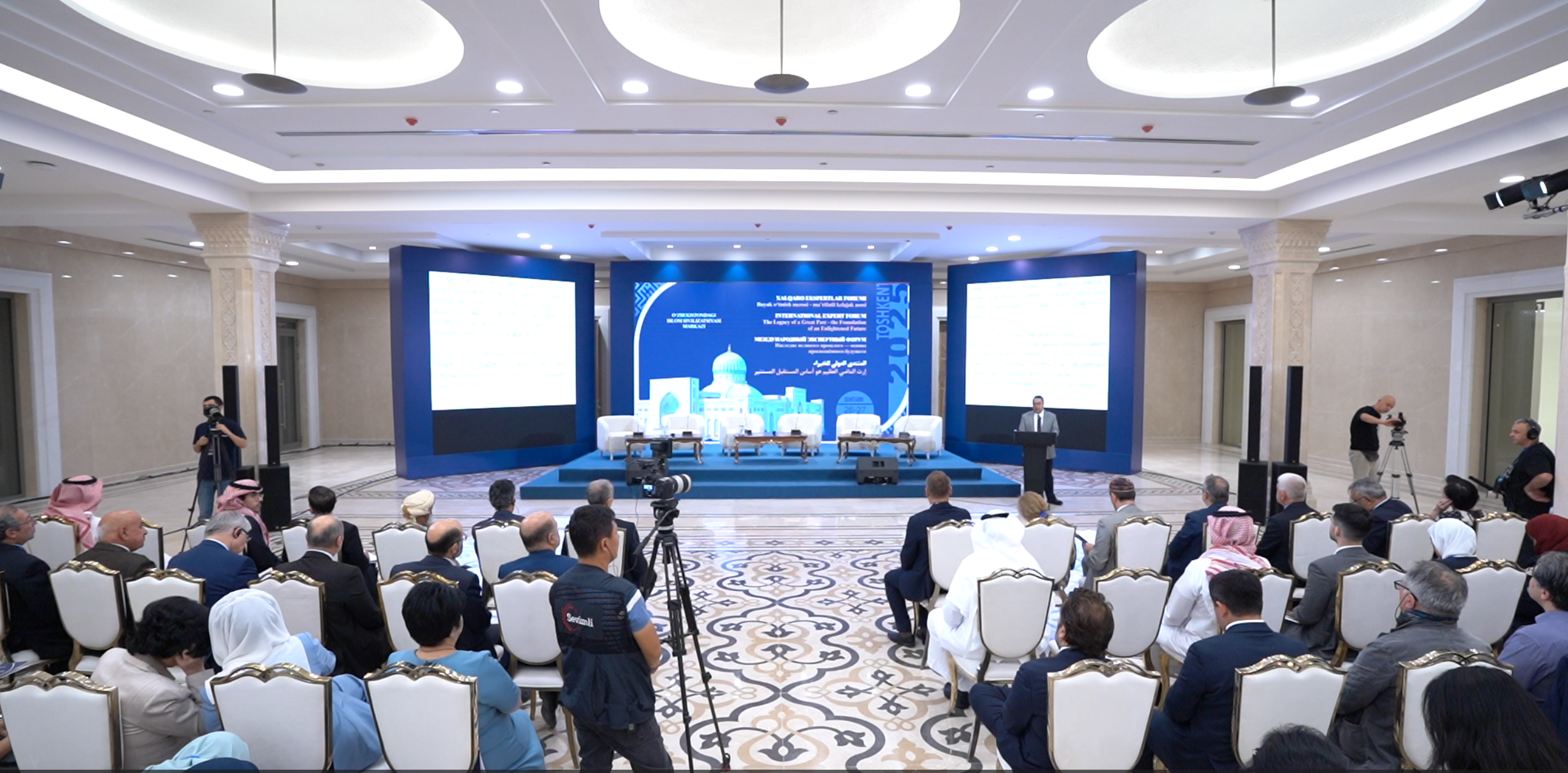The secret of wisdom in a modern exhibition

Mausoleum of Khoja Ahmad Yasawi
In today’s rapidly changing world dominated by digital technologies, the human mind is overflowing with a multitude of information. Yet, as the volume of information increases, it is no secret that hearts are growing emptier and spiritual distress is on the rise. Humanity, caught in the whirlpool of conflicting ideas, is in search of moral grounding. It is precisely in such an environment that ancient sources guiding us toward inner purity, patience, love, humility, honesty, and truth are being rediscovered. One such source is featured in a mega-project in Uzbekistan, the Center of Islamic Civilization established at the initiative and vision of the President.
Considered one of the foundational figures of Sufi literature and a timeless influence on the hearts of our people, the wisdoms (hikmats) of Ahmad Yasawi are a treasure trove that continues to be newly discovered time and again.
Ahmad Yasawi was not only a great mystic of his time but also a healer of souls who conveyed universal values through words. His wisdoms, often in poetic form, address a wide range of topics from inner spiritual struggles to social values such as justice, compassion, and virtue. These teachings do not call for escape from the world’s troubles, but rather for awareness of the world’s deeper essence. They reflect on the subtleties of life, spiritual exploration, inner awakening, and the journey to truth.
Today, it is admirable that our youth are striving toward knowledge, science, technology, and global thinking. However, to tread this path correctly and move toward perfection, spiritual strength is also essential. Yasawi’s wisdoms can serve as a powerful moral foundation on this journey. These teachings do not lose their value with time; on the contrary, they continue to offer answers to the new challenges humanity faces.
When viewed through a modern lens, Ahmad Yasawi’s wisdoms reveal not only religious and moral lessons but also ideas of personal growth, social responsibility, inner awakening, and conscious living. Thus, studying Yasawi’s teachings is not merely a look into the past it is a form of stepping into the future.
The spiritual essence of the wisdoms
Through his wisdoms, Ahmad Yasawi sought to awaken the human heart spiritually and guide it toward divine truth. Embedded within these wisdoms are not only Sufi concepts, but also life experience, spiritual cultivation, and moral lessons. Each wisdom is a cry of pain, a lamentation, and a call to awakening. Below, we analyze the spiritual legacy of this great mystic from a modern perspective, based on selected examples from his wisdoms.
Avoiding hypocrisy: moral vigilance
O brother, do not befriend the hypocrite,
Whoever does so, shall suffer countless afflictions.
This wisdom teaches the importance of caution in choosing companions. It warns against associating with people whose hearts and actions are not in harmony those who are two-faced. Hypocrisy is a destructive ailment that corrodes society from within. As Yasawi warned centuries ago, duplicity, pretentiousness, and deceit continue to weaken the foundation of trust in communities today. True friendship must be based not merely on outward connection, but on spiritual harmony.
What a noble virtue: renouncing the ego
and embracing contentment
He who renounced his ego and chose contentment,
Whatever he found, accepted it with a bowed head.
He served the righteous and earned their prayers,
Such a lover shall have no blame on Judgment Day.
This four-line verse encapsulates an entire philosophy of life. First, Yasawi presents the renunciation of the ego abandoning vices like greed, pride, revenge, and envy as the highest form of spiritual triumph. Contentment, meanwhile, is one of the values steadily vanishing in today’s consumption-driven society. Modern humans desire more possession, yet grow less satisfied. In this context, the wisdom invites us to embrace inner peace, patience, and the culture of acceptance.
Additionally, “serving the righteous and earning their prayers” symbolizes not only the Sufi tradition of serving one’s spiritual guide but also the broader ideal of following enlightened individuals in life and being worthy of their blessings.
The path of love – an infinite realm
As long as you live, the scroll of love shall never be complete.
This verse reveals a profound view of one of the most central Sufi concepts loves (‘ishq), or divine love. Here, love does not merely mean human affection; it signifies the deep, unending love for the Divine, for Truth, and for all of His creation. According to Yasawi, as long as a person lives, their heart must overflow with this sacred love, which constantly drives them toward spiritual quest and purification.
In today’s world, where many seek peace and meaning in life, this line offers a compass to the heart. Love, in this sense, is motion, awakening, and the highest plane of existence.
Knowledge and Reflection – A Form of Worship
Reading and reflecting are acts of worship!
This wisdom reflects Ahmad Yasawi’s deep reverence for knowledge and contemplation. According to him, true worship is not limited to bowing and prostration it also includes learning, thinking, and seeking truth. This idea is especially relevant today: acquiring knowledge, engaging in reflection, and cultivating thought are all vital forms of spiritual purification.
The profound social and spiritual insights found in Yasawi’s wisdoms can serve as a guiding life principle for today’s generation. Indeed, these teachings embody moral immunity, human perfection, and a philosophy of living with truth and love. While the wisdoms may appear simple at first glance, their layered meanings provoke thought, awaken the soul, and nurture character depending on each reader’s inner state.
At the Center of Islamic Civilization being established in Uzbekistan under the initiative of the nation’s leader, Ahmad Yasawi’s wisdoms hold a place of special significance. For centuries, these teachings have shaped the moral compass of our people, and today they serve as a vital source for nurturing the spiritual consciousness of a new generation.
Within the exhibition, Yasawi’s wisdoms are presented not only as part of our historical literary heritage but also as a spiritual guide calling people to purity, patience, honesty, and humility. Without a doubt, these wisdoms continue to serve as a school of inspiration and a spiritual compass for young people today.
Husan Tursunov,
P.S. The article may be used by citing the official website of the Center.
Most read

Over 100 experts from more than 20 countries of the world are in Tashkent!

President of Serbia Aleksandar Vučić visited the Islamic Civilization Center in Uzbekistan

The Center for Islamic Civilization – a global platform leading towards enlightenment











